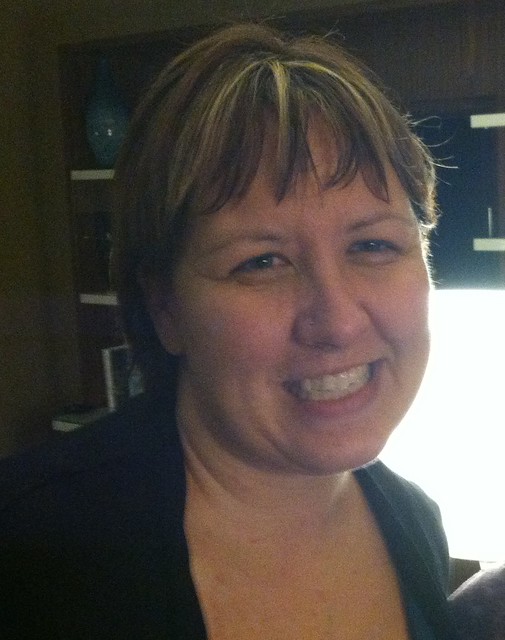Cindy Minnich teaches high school English in Elizabethville, PA and is one of the founding members of the Nerdy Book Club. Cindy and I have "known" each other via Twitter for a couple years but finally met in person at NCTE back in November and it was like running into an old friend you hadn't seen in a while. She is an amazing educator and it is clear from the way that she talks about her students that she was meant to teach high school English.
Follow Cindy on Twitter: @CBethM
Read Cindy's blog: Charting by the Stars
How long have you been teaching?
I have been teaching full-time since 2004.
What initially drew you to a career in education?
I honestly had no idea I would be a teacher when I graduated high school. Or when I graduated with my BA in psychology. I had planned on a career in medicine, not teaching. But I was waiting to see what grad school possibilities were out there when I took a job substituting in neighboring school districts. I subbed and enjoyed it most days and felt grateful that it was giving me some space and time to think about what I really wanted to do. I didn't realize that teaching was what I wanted to do until I had a chance conversation with a teacher I'd subbed for.
I'd gone in to sub for a high school English teacher at my alma mater. The plans were to have them read one of the many literary incarnations of Faustus. (Perhaps Marlowe's?) There were notes for the students read and do the questions at the end of the selection, but I figured that I'd better get them thinking about what the idea of the story was before doing anything. I gave them the premise of the story and then told them that I probably would have traded my soul for a prom date at their age. Such a loaded statement got a reaction and led to questions and discussion - and students willingly dove into the text to see what happened.
I ran into the teacher a couple of weeks later when I was back subbing for someone else. She told me that the kids really understood what they read and were eager to talk about it when she returned - and she asked what I was certified to teach. When I told her that I was only emergency certified to sub, she told me that I might want to reconsider.
Up until that moment, teaching as a profession had never crossed my mind. But after that, I couldn't get the possibility out of my thoughts. I'm grateful for her suggestion and haven't regretted one single moment.
What motivates you as a teacher?
I won't lie - I'm motivated by successes, but challenges keep me moving as well. And there is nothing better than a student saying, "Thank you."
What has been your best classroom memory thus far?
I am always happiest when I am talking about books and reading books with my students. When I read this question, I had a beautiful montage of former classes doing just that playing in my mind.
But if I had to pick the best days, they were when I invited authors to be part of my classes. The day that we Skyped on World Read Aloud Day with David Macinnis Gill, Sarah Darer Littman, and Gae Polisner and the day that Gae Polisner came to my class (in person!).
What do you want the future of education to look like?
I want the future of education to be more about questions and problems - how students can engage in searching for and finding answers and solutions. We shouldn't be testing them on what's been done - we should be encouraging them to apply that as a means to do something more. And that something more should be authentic.
In that future of education, the lines between subject areas would blur. Sure, it'd be messy and uncompartmentalized, but it would be meaningful and memorable...and useful.
What makes you stay in the classroom?
What makes me stay? The fact that I will always have something new to learn in this career. I learn from the kids, I learn from my colleagues, I learn from my reflections - and I get to try to do each day, each unit, each year better every time. There's no chance for boredom because there is no way to reach teaching nirvana. This means I'll get to be a willing student for the rest of my life.
What do the words "use your outside voice" mean to you?
To me that translates to, "Speak up for what's right." We are the experts in our field. We live the realities of public policies in action. We need to use our outside voices to let others know what we know: that funding cuts hurt our students' educations, that what is tested is what is taught, that test scores reflect far more than what's been taught, that people do really care what students think no matter what Mr. Coleman says.


Thanks for your honesty, Cindy (i.e., "I'm motivated by successes, but challenges keep me moving as well.") I feel exactly the same way. While it's great to keep pushing and make breakthroughs, it feels better when you're working with a kid that is showing progress, even if it's in small steps.
ReplyDeleteI love Kate Robert's post at Nerdy Book Club last week (http://nerdybookclub.wordpress.com/2013/06/21/on-having-faith-and-teaching-reading-by-kate-roberts/ ) - a good reminder that the seeds we plant don't always bloom when we hope they will. We have to watch for and celebrate even the little successes along the way.
ReplyDelete